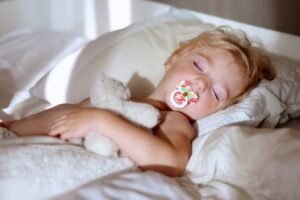
For many parents, pacifiers seem almost indispensable. They can soothe fussy infants, promote sleep, and even lower the risk of SIDS! Certainly, these little tools can be useful, and there is nothing wrong with using them for your little one — but only up to a certain point. Pacifiers have a dark side; improper or prolonged use could negatively affect your baby’s teeth! This blog post explains what you should know.
The Problem with Pacifiers
There are a few potential problems with pacifiers that all parents should be aware of, including:
- They may interfere with breastfeeding. Some babies are very sensitive to the difference between a pacifier and their mother’s nipples; they do not like switching between the two. This may lead to shorter breastfeeding sessions and negatively affect nutrition. For this reason, experts often recommend that a good breastfeeding routine be established before the introduction of pacifiers.
- They can be dirty. Even if you do your best to keep your baby’s pacifiers clean, they can still collect dirt and bacteria, which may increase the risk of dental problems and systemic illness.
- They can cause pacifier teeth. Prolonged pacifier use may adversely affect the development of your baby’s teeth and jaw. Misaligned teeth, bite problems, and malformations of the palate (the roof of the mouth) may occur. These are the same issues that can result from thumb sucking, and they can lead to the need for expensive orthodontic care in the future.
Protecting Your Baby
Here are a few tips to protect your baby’s smile from pacifier-related problems:
- Keep their pacifiers clean. You may want to invest in a UV sanitizing unit. You should also avoid pacifiers that have multiple parts or a removable liquid interior.
- Start weaning them off their pacifiers at the right time. One of the best things you can do to prevent pacifier teeth is to make sure that your child stops using pacifiers by the age of three. This can protect their oral development and greatly decrease the risk of pacifier-related oral health problems.
Some children stop using pacifiers on their own, whereas others need extra help from parents or a skilled pediatric dentist. For example, they might need a special oral appliance to discourage pacifier use. Some children also respond well to alternative forms of comfort, such as a special stuffed animal or nightly story time with Mom or Dad.
Pacifiers can be useful, but they have a dark side! Make wise decisions so you can set your baby’s smile up for long-term health.
Meet the Practice
Drs. Nick Capezio and Ted Loiben have known each other for decades, and they are proud to work together to care for young smiles in Buffalo Grove, IL. They enjoy working with kids of all ages, including infants. If you have questions about how you can care for your child’s oral health, they would love to consult with you. Contact our practice at 847-459-9100 to learn more about how we may be able to serve your family.

